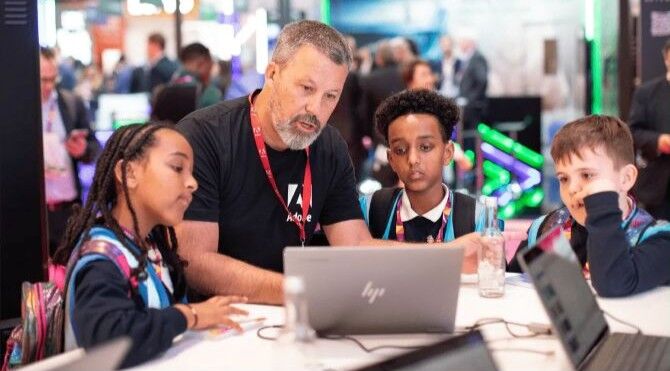What does AI-powered pedagogical transformation look like?
Education panelists at BETT looked at education through the lens of an AI evolution and explored how it would reshape learning for tomorrow’s students. Ledetta Asfa-Wossen reports.

This article is taken from the Leadership Supplement the Spring 2025 issue from
Relocate Think Global People
Click on the covers to access the digital editions.How can we responsibly use AI to create a more effective, equitable, and future-ready education system for generations to come? It was a big question, but one the panel was ready to dissect.Taking the temperature of the audience, moderator Minh Ngan Tran, Chief Operating Officer at Goodnotes, began by asking attendees how they felt about AI – if they were anxious, or excited.Turning to his panel, he then asked them to imagine a 5-year-old girl called Betty starting school in September. He urged panellists to explore what Betty’s educational journey might look like progressing through primary, secondary, and higher education and how AI could transform her learning experience by the time she enters university in 2040.
The panel:
Lord Jim Knight, Director of Suklaa Ltd and former UK minister for schools, digital and employmentProfessor Rose Luckin, Professor and Founder, UCL and Educate VenturesRowena Chung, Product Director, Education, Goodnotes Panellists on the main stage at BETT included Lord Jim Knight, Rowena Chung, Prof Rose Luckin and Minh Ngan Tran
Panellists on the main stage at BETT included Lord Jim Knight, Rowena Chung, Prof Rose Luckin and Minh Ngan TranWhat does the future of education hold for five-year old Betty?
Professor Rose Luckin: I have absolutely no doubt that AI will transform education. However, we don’t know exactly how it will change. I’m not going to make predictions, but I know what I’d like to see happen for both students and educators if we get things right. I also want to talk about assessments, because that’s a key part of what will drive Betty to a better future.I would like to see Betty as very self-effective. She understands where she wants to go. She knows how she wants to learn and is encouraged to master learning and knowledge. She will have become highly AI-literate and know how to use AI technologies to be the most effective learner that she can be. This will help her understand herself and allow her to build strong meta-cognitive skills to assist her learning but also to improve her understanding of her world. Betty will also be supported by an assessment system that helps her to do all of that.I would like to see the subject disciplines as the medium through which she gains advanced and sophisticated thinking and learning skills, the kinds of things that AI is not so good at because we don’t want students learning the same things AI is already good at. She needs to be much more sophisticated in her learning and thinking.I see teachers being able to orchestrate AI and identify the appropriate use of technologies for their students, in particular how these technologies can help Betty become the most effective learner she can be. So AI is very much in the background, supporting that learning process.I want to see teachers and students being highly AI-literate, so Betty is really set up to be self-effective in the world and is able to prosper in an AI-enhanced world.What does the classroom of the future look like for her?
Lord Jim Knight: I think Betty will really look forward to getting to her classroom. The classroom will be a really special, human-centric place. Betty will have a learning device. We’ll probably have learnt by then that mobile phones and personal devices coming into the classroom doesn’t work but that learning devices are really important. Learning devices will be able to be used far more intuitively and be smartly controlled by teachers and educators to restrict certain types of content.I think the classroom will be a place where tech does not constantly bother students with notifications and noise but instead acts as a very human and peaceful place.The flipped learning model will have been fully embedded and Betty will have done her homework at home. Most of the instructional element of her learning will have happened at home, so she’ll come to school knowing what she’s supposed to know, with a teacher there to assess and understand what she has and hasn’t understood and who will leave her to struggle and problem solve.Learning to struggle is very important in the world of AI because AI makes everything easier. If things are too easy, we don’t learn anything. Struggle is a fundamental part of learning. Teachers will be there to help and guide struggle in a way that feels constructive, social and collaborative and has an element of fun attached to it. Betty now wants to come to school because it’s full of joy and struggle.Read related articles
- Embracing a human approach to AI
- Exploring AI in international schools
- AI and inclusion in tech
- AI in education
 Students unlock their creativity with the latest ed tech solutions at BETT
Students unlock their creativity with the latest ed tech solutions at BETTWhat will be essential for the future classroom?
Rowena Chung: In 15 years from now I have no doubt AI will be well-integrated and embedded in all aspects of our life, whether that’s schools or work.I think the traditional way of learning with trial by error and slowly building your expertise and developing judgment is going to go away when we’re continually defaulting to AI to come up with a solution.In today’s classroom, it’s really important that we help the likes of Betty to develop that human agency and think about how we keep students motivated and not too over-reliant on AI so they exercise and build on developing their judgement.Classrooms should be collaborative laboratories where students are having interactive discussions and building on each other’s ideas and learning how to build consensus.At Goodnote, we really think about how to facilitate those learning and teaching moments. I think classrooms will need to encourage and foster this type of learning that involves more meaningful interactions, versus an assessment based education system.Learning is inherently difficult. If AI is really going to make learning ‘much easier’ how do we encourage students to make that effort?
Professor Rose Luckin: One thing I am sure about is that this moment in time is supremely important. It’s a moment where we as humans have to recognise that we need to get smarter. This is not a time to dumb down. We now have these AI technologies and what we absolutely must do is realise that we are not finished works, our intelligence hasn’t finished evolving.We can be a lot more intelligent than we are now and we need to be, because we now have these tools. That means we have to work harder, it’s going to be more strenuous mental effort and that’s quite a hard message to convey – particularly, when you have tech companies suggesting AI is going to make things effortless. Sorry, no – learning is never effortless, it’s difficult and to a certain extent it should be. The things I have valued most in my learning have been the hardest. We have to find ways to motivate people to want to engage in that strain.One of my greatest worries is that we dumb ourselves down and inappropriately offload important activities to AI and then we won’t be able to do it anymore. We need to make the right decisions about that and realise that we have to be smarter, and actually that’s great, because we can become smarter with AI tools.AI in numbers69% of schools have not yet implemented AI technologies62% believe AI will make academic cheating more difficult to detect79% of teachers think AI won’t be able to replace teaching essential life skills*Source: The Rise of AI in Education 2024 by BETT UK and Lenovo |




Find out more about the Think Global People and Think Women community and events.

Subscribe to Relocate Extra, our monthly newsletter, to get all the latest international assignments and global mobility news.Relocate’s new Global Mobility Toolkit provides free information, practical advice and support for HR, global mobility managers and global teams operating overseas.
©2025 Re:locate magazine, published by Profile Locations, Spray Hill, Hastings Road, Lamberhurst, Kent TN3 8JB. All rights reserved. This publication (or any part thereof) may not be reproduced in any form without the prior written permission of Profile Locations. Profile Locations accepts no liability for the accuracy of the contents or any opinions expressed herein.










































